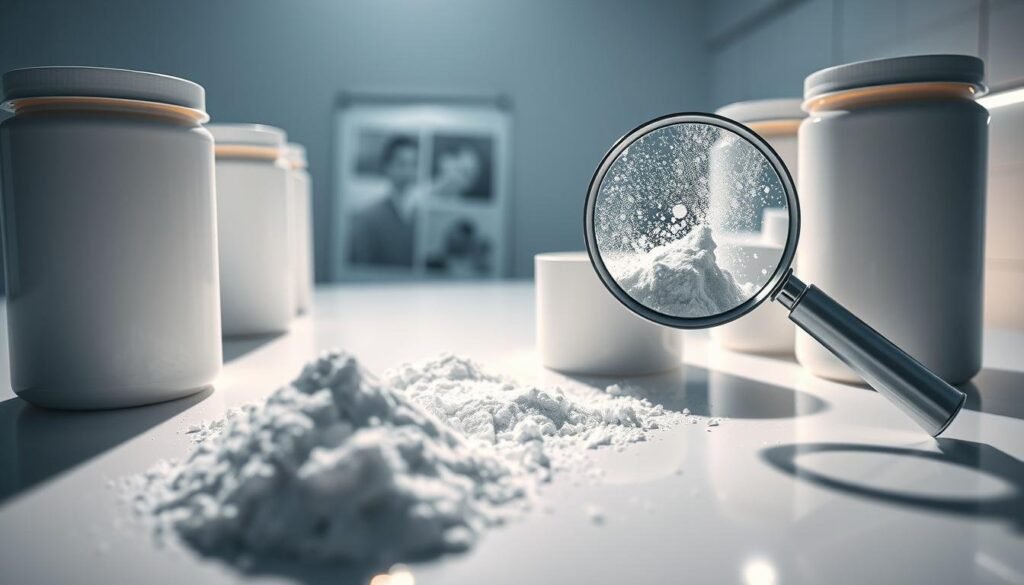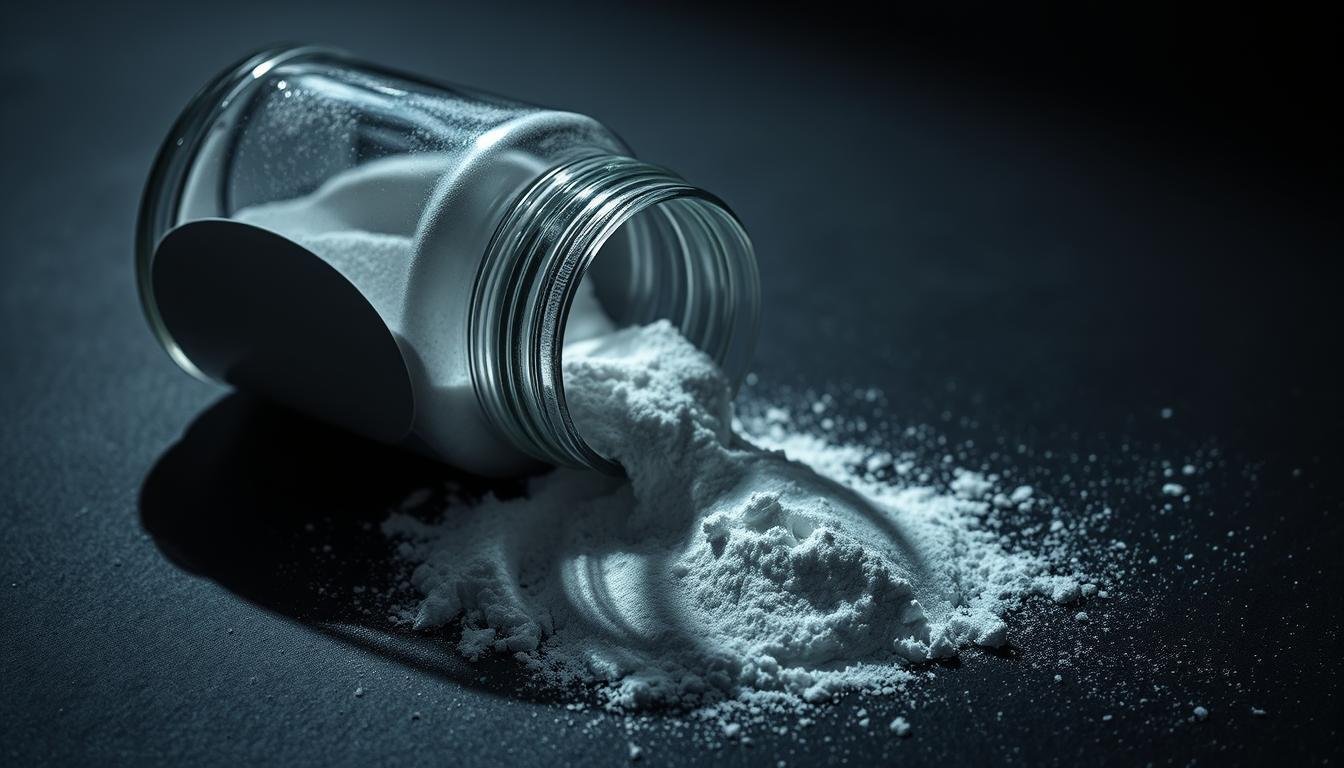Last updated on August 25th, 2025 at 04:32 pm
Some products can be very harmful if swallowed. You might be surprised to learn that a common item used for years has serious health risks if eaten.
Talcum powder, often used for personal hygiene, contains harmful ingredients. If swallowed, these risks can lead to severe health problems.
It’s important to know what’s in these products and the health dangers they pose. Being aware of these risks helps you avoid accidental ingestion.
Contents
- 1 What Is Baby Powder? Understanding Its Composition
- 2 Can Baby Powder Kill You If You Eat It? Examining the Risks
- 3 Health Hazards of Ingesting Baby Powder
- 4 Different Risk Levels: Children vs. Adults
- 5 Emergency Response: What to Do If Baby Powder Is Ingested
- 6 Conclusion: Prevention and Safety Practices
- 7 FAQ
- 7.1 What are the main ingredients in baby powder?
- 7.2 What happens if you inhale baby powder?
- 7.3 Can ingesting baby powder cause organ damage?
- 7.4 Are children more susceptible to the risks of ingesting baby powder?
- 7.5 What should you do if someone ingests baby powder?
- 7.6 Are there any alternatives to using baby powder?
- 7.7 Can adults be at risk of health complications from baby powder exposure?
What Is Baby Powder? Understanding Its Composition
Have you ever wondered what baby powder is made of? It’s used to keep skin dry and prevent friction. It’s common in diaper care and personal hygiene. But, what’s in it? The main ingredients are either talc or cornstarch, depending on the brand.
Baby powders with talc have raised health concerns. Talc is a mineral with magnesium, silicon, and oxygen. On the other hand, powders made from cornstarch are seen as safer. They are less likely to cause breathing problems when inhaled.
Talc vs. Cornstarch-Based Baby Powders
The big difference between talc and cornstarch powders is their ingredients and health risks. Talc powders are risky, so some brands use cornstarch instead. Both are good at soaking up moisture, but talc has more health concerns.
| Ingredient | Talc-Based | Cornstarch-Based |
|---|---|---|
| Primary Component | Talc (magnesium, silicon, oxygen) | Cornstarch |
| Respiratory Risk | Higher risk of inhalation issues | Lower risk of inhalation issues |
| Safety Concerns | Potential contamination with asbestos | Generally considered safer |
When picking a baby powder, think about the ingredients and their health effects. Knowing the difference between talc and cornstarch can help you choose wisely.
Can Baby Powder Kill You If You Eat It? Examining the Risks
Eating baby powder can lead to serious health problems. It’s made for use on the skin, not for eating. Ingesting it can cause severe health issues.
When you eat baby powder, it can harm your lungs. The talc in it can get stuck in your lungs. This can cause inflammation and serious health risks.
Respiratory Issues and Other Complications
Eating baby powder can lead to lung problems. The talc can cause:
- Inflammation in the lungs
- Granulomas, which are areas of inflamed tissue
- Chronic respiratory problems
Other complications include stomach problems and severe allergic reactions. These can be very serious.
| Health Risk | Description | Potential Outcome |
|---|---|---|
| Respiratory Issues | Inhaling talc particles can cause inflammation and granulomas in the lungs. | Chronic respiratory problems, potentially life-threatening conditions. |
| Gastrointestinal Problems | Ingesting baby powder can lead to gastrointestinal irritation and other digestive issues. | Severe discomfort, potentially requiring medical intervention. |
| Allergic Reactions | Some individuals may experience severe allergic reactions to talc or other ingredients in baby powder. | Potentially life-threatening anaphylaxis or other serious allergic responses. |
It’s important to keep baby powder away from children. If you think someone has eaten it, get help right away.
Health Hazards of Ingesting Baby Powder
Ingesting baby powder can harm your body in many ways. The tiny particles can damage your insides and cause serious problems. This is because baby powder is not made for eating.
One big worry is organ damage. The small particles can get into your lungs, liver, and kidneys. This can hurt these important organs.
Potential for Organ Damage
Ingesting baby powder can lead to health issues, including:
- Respiratory problems from inhaling powder particles
- Gastrointestinal blockages or damage from powder buildup
- Potential toxicity from chemicals in the powder
The risks come from baby powder’s ingredients, like talc. These are not safe for people to eat. Eating such substances can be very dangerous and might need quick medical help.
It’s important to know the risks and take steps to avoid eating baby powder, especially for kids. Keep baby powder away from children and use it carefully to avoid accidents.
In summary, eating baby powder can lead to serious health problems, including organ damage. It’s vital to handle baby powder safely and understand the dangers of eating it.
Different Risk Levels: Children vs. Adults
Children and adults face different risks when it comes to baby powder. Kids are more likely to accidentally eat it because they are curious and don’t know the dangers.
When kids eat baby powder, it can cause serious breathing problems. This includes aspiration pneumonia. The powder can get into their lungs, leading to inflammation and serious health issues.
Adult Exposure Risks
Adults might get exposed to baby powder at work or when they use it for personal care. While adults are less at risk than kids, there are still health concerns.
- People working with talcum powder might face long-term breathing problems.
- Some adults use baby powder for personal hygiene without knowing the risks.

Adults need to know about the dangers of baby powder. They should use safer alternatives and follow safety rules when handling talcum powder.
It’s important to understand the risks for kids and adults. By knowing the dangers and taking steps to prevent them, we can keep everyone safe from baby powder-related health issues.
Emergency Response: What to Do If Baby Powder Is Ingested
If someone eats baby powder, it’s a serious situation that needs quick action. The first thing to do is stay calm and check the situation fast.
If the person is awake, do not try to make them vomit unless a doctor tells you to. Call emergency services or a poison control center right away. They can give important advice based on how much was eaten and the person’s health.
When you get to the hospital, doctors will start treating the person. They might do an X-ray or CT scan to see if the powder blocked anything inside. They might also give activated charcoal to help get rid of the powder, but this depends on the situation.
Doctors will also watch the person’s health closely and make sure they drink enough water. If the situation is very bad, the person might need to stay in the hospital. This is to keep them safe and prevent serious problems later.
Knowing what to do if someone eats baby powder can really help. Always follow baby powder safety precautions to avoid problems. And be ready for emergencies by knowing what to do.
Conclusion: Prevention and Safety Practices
To stay safe from baby powder risks, follow important safety steps. Keep it away from kids and don’t breathe it in or swallow it. This helps avoid any dangers.
Always use baby powder as the maker says. Be careful when you put it on, and don’t get it near your face. If you’re worried, try safer options like cornstarch or fragrance-free powders.
Alternatives to Baby Powder
Looking for safer choices? Try products made for sensitive skin or natural ones. Coconut oil or talc-free powders are good options. You can also use baby lotions or creams for similar uses without the risks.
Knowing the dangers of baby powder and taking safety steps can keep you and your family safe.
FAQ
What are the main ingredients in baby powder?
Baby powder usually has talc or cornstarch. Talc is a mineral with magnesium, silicon, and oxygen. Cornstarch comes from corn and is a carbohydrate.
What happens if you inhale baby powder?
Inhaling baby powder can lead to breathing problems. This includes coughing, wheezing, and feeling short of breath. In serious cases, it can cause life-threatening conditions like acute respiratory distress syndrome.
Can ingesting baby powder cause organ damage?
Yes, ingesting baby powder can harm organs. The particles in talc or cornstarch can cause inflammation and scarring in the digestive tract. This can lead to serious issues like bowel obstruction or perforation.
Are children more susceptible to the risks of ingesting baby powder?
Yes, children are more at risk from ingesting baby powder. Their small size and developing bodies make them more vulnerable. Accidental ingestion often happens during diaper changes or other care activities.
What should you do if someone ingests baby powder?
If someone ingests baby powder, seek medical help right away. Call a poison control center or emergency services for advice on what to do next.
Are there any alternatives to using baby powder?
Yes, there are alternatives to baby powder. You can use gentle, fragrance-free cleansers and moisturizers on the skin. Cornstarch-based or talc-free powders are also good options.
Can adults be at risk of health complications from baby powder exposure?
Yes, adults can face health risks from baby powder exposure. This is especially true for those exposed to large amounts of talc or cornstarch over time, like through work.

Hello, I am Bellamy George, a certified nutritionist and food safety specialist from Springfield, IL. With a degree in Food Science, I share research-backed insights on edible foods, seeds, and seafood for safe, informed eating.

